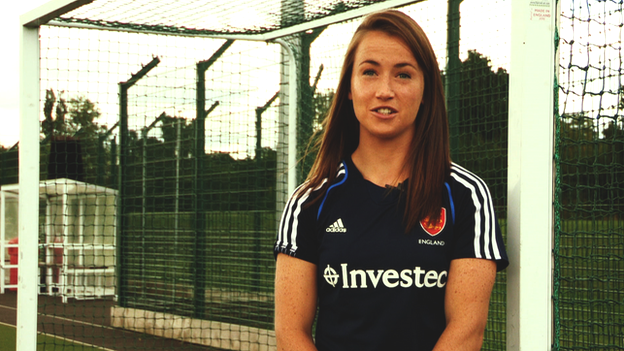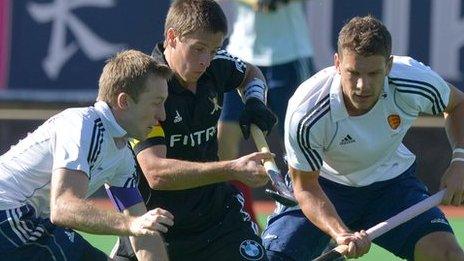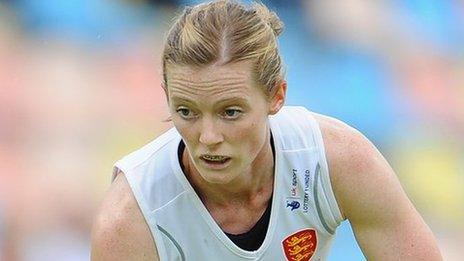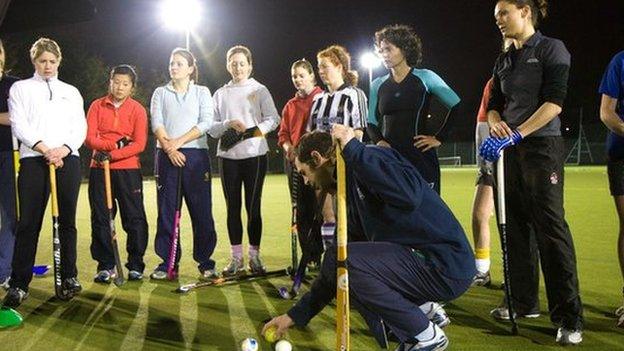Hockey goalkeeping a scary thrill - England's Maddie Hinch
- Published

Maddie Hinch smirks when she remembers how she drew the short straw to become a hockey goalkeeper.
"I was the new kid at school and there just happened to be a goalkeeping position available," she tells BBC Sport. "Which always seems to be the case."
Unsurprisingly, there are not many children who volunteer to have solid hockey balls fired at them during bitterly cold mornings on the sports field.
But Maddie wasn't like most children.
Getting back into hockey
"I used to throw myself around a lot in rounders. I would unnecessarily dive for a ball rather than step left or right, which I guessed showed an element of goalkeeping that the coaches picked up on," she recalls.
"So I was shoved in goal and it went from there."
Just over a decade later and 24-year-old Hinch is first-choice keeper for England and has earned 16 caps. She still has not quite got used to having balls shot at her, though.
"Any hockey goalkeeper who says they've never closed their eyes for a second and thought, 'please don't hit me' is lying. There are definitely those scary moments," says the Holcombe player, who wears protective goalie kit weighing up to 15kg during matches.
"It's something that you grow to enjoy, which sounds slightly weird. You're the last person in line and you can keep the team in it and potentially win games. It's a complete thrill."
In June Hinch was awarded player of the tournament in her first real taste of international hockey as the country's number one - the World League Semi-Finals in London.
But it has been a tumultuous journey to the top. When England won a bronze medal at the last European Championships in 2011, she was the reserve keeper and did not play a game.
Then when Great Britain celebrated a bronze medal at their home Olympics in London last summer, Hinch was watching from the stands of the Riverbank Arena, having been left out of the squad.
"It was obviously incredibly hard, but with the goalkeeping situation we always knew Beth [Storry] was going to be number one," Hinch explains.
"There was always that option of being that second choice and being there in the village with the squad. To not get that was heartbreaking. But I think going and being able to watch us perform at an Olympic Games has inspired me even more to be a keeper at the next one."
Now that the next Olympic cycle is under way, the ultimate goal is winning silverware at Rio 2016. But first, Hinch and her relatively new group of team mates must negotiate the forthcoming European Championships in Belgium.
When England won bronze back in 2011, it was their fourth straight third-placed finish at a Euros and their seventh consecutive appearance in a bronze medal play-off. The previous year they also came third in the World Cup, Commonwealth Games and Champions Trophy events.
But this is a new squad - five players involved at London 2012 has since retired - with a new coach. Third place is not on their minds.
"In Chiswick [at the World League tournament], we did very well and surprised ourselves a little bit. So if we go in [to the Euros] with that open mind and not put too much pressure on ourselves, I can't see why we can't make the final," says Hinch.
England head into the competition as the second-highest ranked team. But new coach Jason Lee has altered the squad's playing style to more "open, fast, exciting hockey", as Hinch puts it.
"Jason is trying to bring in some new ideas. He's convinced us that it will work," says Hinch. "We can definitely see in some of the training games that it doesn't quite work. We might have the odd result where everyone might go, 'Ooooh', but we're looking long term."
Find out how you can get involved in hockey by going to our Get Inspired: HOCKEY pages or England Hockey's Back To Hockey, external page.
- Published23 August 2013

- Published7 August 2013

- Published3 October 2018
